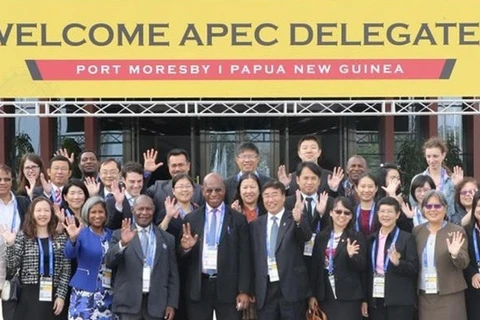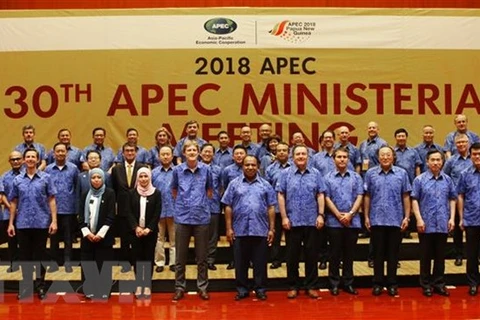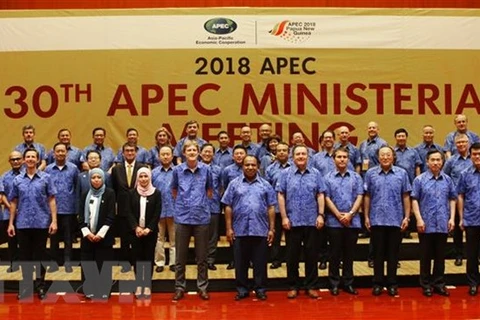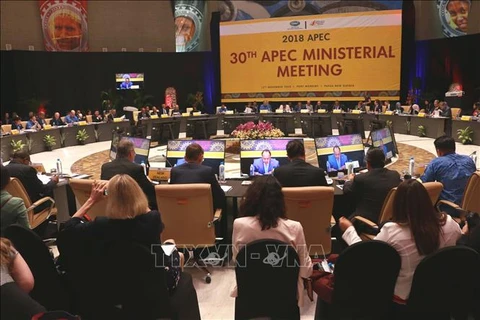 The 10th APEC Ministerial Meeting in Malaysia in 1998, during which Vietnam, Russia and Peru were admitted to APEC. (Photo: VNA)
The 10th APEC Ministerial Meeting in Malaysia in 1998, during which Vietnam, Russia and Peru were admitted to APEC. (Photo: VNA)
Hanoi (VNA) – The accession to APEC on November 14, 1998 marked a big step forward in Vietnam’s foreign policy of door opening, multilateralisation, diversification and international economic integration, which created a driving force for the country’s renewal and integration during the past two decades.
This is the assessment of Deputy Prime Minister and Foreign Minister Pham Binh Minh in an article titled “20 years in APEC: from a strategic vision to Vietnam’s imprints” on the occasion of Vietnam’s 20-year membership in the Asia-Pacific Economic Cooperation (APEC) forum.
According to Deputy PM Minh, as the leading economic cooperation mechanism in Asia-Pacific, a region home to global economic, commercial and technological hubs, APEC has brought various benefits to Vietnam in terms of strategy, economics, trade and investment, thus contributing to the country’s comprehensive development.
First of all, it is noteworthy that half of Vietnam’s 28 strategic, comprehensive and key economic and trade partners are members of APEC. Together, they account for 75 percent of the country’s total foreign trade, 78 percent of direct investment and 79 percent of foreign tourists. In addition, 14 out of 16 free trade agreements (FTAs) that Vietnam has signed or is negotiating, concerns 17 APEC members.
Second, APEC membership has significantly enhanced Vietnam’s position in the international arena. As an APEC member, Vietnam has an equal voice with many world leading economies in the building and formation of regional economic and commercial rules and regulations.
Third, the APEC forum is an important channel for Vietnam to promote bilateral ties, helping deepen ties with partners, consolidating the peaceful environment for national development.
Fourth, joining APEC and carrying out commitments on door opening for trade and investment and business facilitation has helped push reform and the completion of institutions and policies in the country towards meeting international commitments. It also creates the prerequisite for Vietnam to participate in larger playing fields with higher-level commitments such as the World Trade Organisation (WTO) and FTAs, including new-generation FTAs with high standards. The implementation of international commitment also gives the country the leverage to realise its resolve to build a facilitating and action-oriented government of integrity to serve the people and businesses.
Fifth, as an APEC member, Vietnam has received help to enhance its capacity of international integration. The implementation of commitments, synchronisation of policies, and APEC’s support projects have helped improve the international integration capacity for ministries, sectors, local administrations and enterprises, as well as deepen the knowledge and experience of officials involved in international integration.
Lastly, APEC brings great potential and opportunities for Vietnamese enterprises in accessing markets and advanced technology, favourable investment and business environment and convenient transport, and seeking strategic partners.
Deputy PM Minh highlighted Vietnam’s active role in APEC, thus contributing to peace, stability, cooperation and economic connectivity in the region, maintaining APEC’s role as the leading economic cooperation mechanism in Asia-Pacific.
Vietnam is among a few APEC members having hosted APEC summits twice, in 2006 and 2017.
It is also among the most active members in proposing ideas and projects, authoring more than 100 projects in various fields.
The country has held many positions in APEC committees and working groups. Its business community also actively participates in and makes many recommendations to APEC.
The Deputy PM affirmed that APEC will continue to be one of the main points in Vietnam’s foreign policy in the current development period.
“Vietnam will continue to accompany APEC in the next development period, join hands in building a strategic vision on an Asian-Pacific community of peace, stability, dynamism, innovation, and prosperity,” he stressed. -VNA























